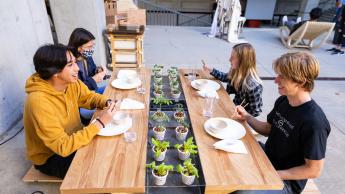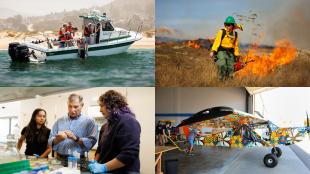Five Things to Know about COVID-19 Protocol for Spring Quarter

Since March 2020, Mustangs have shown incredible resiliency in the face of evolving health and safety protocols on campus — and more are on the way. Spring quarter is set to bring some major changes to the way the campus community operates as the most recent wave of COVID-19 cases recedes. Here are the updated requirements:
1. Masks are no longer mandatory in most places.
Beginning March 28, masks will no longer be required in most indoor situations — including classrooms and labs — for students, employees and visitors regardless of vaccination status. A President’s Office email March 10 announced the change, citing the campus’ high vaccination rate, testing programs and evolving guidance from the Centers for Disease Control, the California Department of Public Health, Cal/OSHA and the San Luis Obispo County Public Health Department.
Masks will continue to be mandatory for everyone in health care settings and in transportation settings, including the Health Center, COVID-19 testing site and Mustang Shuttle vehicles.
Even with the mandate dropped, people can still choose to wear masks anywhere on campus for added protection, peace of mind or other reasons. Free N-95 masks are available to students, faculty and staff at the University Union, the Disability Resource Center (DRC) and the Recreation Center. It’s still a good idea to carry a mask with you at all times in case of an emergency.
For anyone who has special circumstances please reach out to the DRC (students) or your supervisor (employees).
2. Vaccines and boosters are still required.
In order to be considered fully vaccinated, students and employees must receive a primary COVID-19 vaccine series and a booster when eligible. Medical or religious exemptions are available. Students and employees can upload proof of their booster in the COVID-19 info tab of the portal. The deadline for employees to submit their records depends on their bargaining unit, outlined in the FAQs here.
Rite Aid will host free vaccine clinics April 1 and 29 from 10 a.m. to 5 p.m. in the Rec Center, Room 109, providing Pfizer and Moderna COVID-19 vaccines and booster shots, and flu vaccines. No appointments are necessary — walk-ins only.
3. Testing is still available on campus.
Students who are not fully vaccinated are required to upload proof of a negative COVID-19 test before returning to campus from spring break. Those students have received specific instructions on how to upload their test results.
The on-campus COVID-19 testing site will be open in UU221 Sundays-Thursdays from 8 a.m. to 4 p.m. during spring quarter. Swing shift employees will be able to test 6-8 a.m. on Sundays, Mondays and Thursdays. The site serves asymptomatic students, faculty and staff only and requires that everyone make an appointment at least an hour before arrival.
There are a few dates with special hours. The testing site will be open Saturday, March 26, from 8 a.m. to noon and Friday, April 1, from 8 a.m. to noon.
Students and employees who are not fully vaccinated must participate in ongoing COVID-19 testing throughout the quarter. SSO lock outs begin April 11 for students who don’t comply with mandatory testing.
4. Don’t forget your daily self-screener or campus pass.
Students are required to use the daily self-screener to show a campus pass when accessing campus facilities until further notice. Report any symptoms or positive test results through the screening tool. The pass can still be checked by faculty and staff in classroom settings and at access points to buildings or offices.
As always, stay home if you feel ill and continue basic hygiene practices, including washing or sanitizing your hands throughout the day and disinfecting regularly touched or common surfaces.
5. Stay informed in case things change.
Cal Poly’s protocol may shift throughout the quarter if public health conditions change. Keep yourself informed by checking your Cal Poly email and visiting the university’s coronavirus website and roadmap website.
Most importantly, be considerate as the entire campus community adapts to these changes. The campus community thrives when Mustangs take care of one another.
Want more Learn by Doing stories in your life? Sign up for our monthly newsletter, the Cal Poly News Recap!




